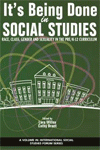
It’s Being Done in Social Studies
Race, Class, Gender and Sexuality in the Pre/K-12 Curriculum
Edited by:
Lara Willox, University of West Georgia
Cathy A. R. Brant, Rowan University
A volume in the series: International Social Studies Forum: The Series. Editor(s): Cathy A. R. Brant, Rowan University.
Published 2018
After a recent CUFA conference, many social studies teacher educators came to realize that pre-service teachers are skeptical of calls to integrate sensitive topics in the curriculum because they do not see it in their field experiences. The purpose of this edited book is to share examples of Pre/K - 12 grade teachers, schools, or school systems that infuse race, class, gender and sexuality in the curriculum. This book offers concrete examples of social studies teachers, schools and schools systems committed to the inclusion of topics often deemed as sensitive or controversial.
Care was taken to provide examples from diverse geographic areas, school types (public, charter, private etc.), and grade levels. Researchers teamed with practicing professionals to highlight teachers and schools that successfully integrate race, class, gender and/or sexuality in the curriculum. The chapters provide specific examples of content inclusion, share high leverage practices, and provide advice for others infusing race, class, gender, and sexuality in the curriculum.
CONTENTS
Foreword, Tyrone C. Howard. Introduction, Lara Willox and Cathy Brant. Preface. PART I: ELEMENTARY. From Suffrage to Stereotypes: Exploring Historical and Contemporary Gender Issues With Elementary Students, Jennifer Burke and Jennifer Mitchell. He Called Me White, Ay That’s Racist! Breanna Nunez. Embracing a Transformative Curriculum: A Fifth Grade Teacher’s Work, Andrea S. Libresco, Rosebud Elijah, and Lauren Brown. Imagining Rainbows: A Case Study of LGBTQ Implementation into Elementary School Curriculum, Bretton A. Varga and Marie Byrd. Culturally Relevant Classroom Libraries: Including All Students in Powerful Social Studies, Aubrey Brammar Southall and Cynthia Trapanese. Teaching Tolerance’s Perspectives for a Diverse America: A Resource for Elementary Educators Who Want to Teach about Race, Class, Gender, and Sexuality While Meeting National Standards, Kate Shuster and Amber Makaiau. Teaching Wealthy Children about Economic Inequality, Katy Swalwell, Melissa Lambert and Jennifer Oliva. Nurturing Our Youngest Citizens: Race, Class, Gender, and Sexuality in the Pre-K Curriculum, Jennifer E. Killham, Jenilyn Bell, Pat Emmelhainz, Shali Cox, Lua Buultjens, and Rachel King. PART II: MIDDLE GRADES. “It’s Because Their Kids Have a Voice”: Teaching About the 2017 Executive Immigration Ban in an Ethnically Diverse Classroom, Mark Pearcy, Michael Jackson and Regina Santangelo. Even in the 50th Education State, It’s Being Done, Bea Bailey and Marta Bohnenberger. Being an Upstander: Build Bridges and Increase Understanding Through Refugee Advocacy, Jennifer E. Killham and Nance Morris Adler. Critical Practices to Develop Student Agency in Rural Contexts, Michael Kopish and Jadey Gilmore. Exploring Power in Middle Grades Social Studies Education, Alexander Cuenca and Joseph McAnulty. “Why Does This Matter?” Using Current Events About Islamophobia and Racial Unrest to Understand the Past, Jennifer Killham, Joshua Harris, and Prentice Chandler. PART III: HIGH SCHOOL. Build Your Own Course: Creating a Controversial Issues Class at an Appalachian High School, Eric D. Moffa. “Dinosaurs in the Hood?” Introducing Intersectionality in the Social Studies Classroom, Whitney Blankenship and Calla Hardiman. Going Beyond the Single Story of Suffrage: Teaching Gender Rights and Protests through Film, Erin Hill, Lauren Colley and John P. Broome. Traviesas/os: Tactics and Stories of Insurgent Social Studies Teachers, Brian Gibbs. It’s Being Done in the State of Hawai‘i: Ethnic Studies as a Requirement for Public High School Graduation, Amber Strong Makaiau. The Gender Equity Club, Daniel T. Bordwell. “Care Comes First” Creating a Space for Controversy, Carly Muetterties, Whitney Walker, and Tracey Bolinger. The Aurora Urban Planning Simulation: Teaching About Class through Spatial Inequality in Secondary Social Studies, Colleen Boucher and John P. Broome. Teaching Intersectionality and the Long and Ongoing Women’s and Gay Rights Movements in U.S. History, Hillary Parkhouse and Tracey Barrett. Facing Problems of Practice and Privilege: A Class Trip to Montgomery, Alabama to Confront a History of Racial Violence Legal Injustice, Christoph Stutts and Matt Cone. Biographies.
-
Paperback978-1-64113-438-5
Web price: $45.04 (Reg. 52.99)
-
Hardcover978-1-64113-439-2
Web price: $80.74 (Reg. 94.99)
- eBook978-1-64113-440-8

- EDU029040 - EDUCATION: TEACHING METHODS & MATERIALS: Social Science
- SOC008000 - SOCIAL SCIENCE: ETHNIC STUDIES: General
- SOC032000 - SOCIAL SCIENCE: Gender Studies
-
 Best Practices in Social Studies Assessment
Best Practices in Social Studies Assessment
-
 Democracy's Discontent and Civic Learning
Multiple Perspectives
Democracy's Discontent and Civic Learning
Multiple Perspectives
-
 Machines
Machines
-
 Mending Walls
Historical, Socio‐Political, Economic, and Geographical Perspectives
Mending Walls
Historical, Socio‐Political, Economic, and Geographical Perspectives
-
 Practical Strategies for Teaching K-12 Social Studies in Inclusive Classrooms
Practical Strategies for Teaching K-12 Social Studies in Inclusive Classrooms
-
 Sustainability, Growth, and Globalization
A Social Science Perspective
Sustainability, Growth, and Globalization
A Social Science Perspective
-
 The Status of Social Studies
Views from the Field
The Status of Social Studies
Views from the Field

